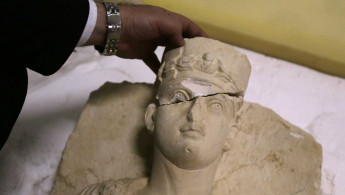'Invisible solution' crucial in fight for Syria's cultural heritage
Syria's ongoing war has decimated the country's cultural heritage.
The Islamic State group has destroyed priceless monuments such as Palmyra's famous Roman-era Arch of Triumph, while other heritage sites such as the souqs of Aleppo, Damascus' Ummayad mosque, and the ancient city of Bosra, in Daraa province, have all been damaged by more routine forms of conflict.
Both IS, other combatant forces, and criminal gangs, operating inside Syria have also sought massive profits through the illicit smuggling of antiques and ancient artefacts.
However, in the face of this threat Syrian archaeologists - operating in opposition-controlled territories of the war-torn country - have begun using an innovative product aimed at deterring smugglers.
They have begun painting artefacts including Roman mosaics, Byzantine sculptures, and ancient pottery deemed valuable with a solution, invisible to the naked eye, but detectable under ultra-violet light.
The invisible solution was developed by Smartwater, a UK crime prevention firm and consequently tested by research teams at the UK's Reading University and Shawnee State University in the US where trials were presided over by Amr al-Azm, a Syrian archaeologist and history professor.
It can be used on a variety of material including stone, ivory, ceramic tile, glass, and pottery.
 |
| Aleppo's souq became a battlefront soon after conflict broke out in the city in 2012 and currently lies in a state of utter disrepair, August 2012 [Archive/AFP] |
Speaking to The New Arab, Azm explained that the idea to test, and then consequently use the product to mark valuable Syrian antiquities came about following a meeting with SmartWater co-founder Phil Cleary in Washington DC last year.
After successful chemical trials showed that the polymer solution developed would not damage artefacts it was transported to Turkey in January, before being shipped across the Syrian border.
The product was donated by the SmartWater Foundation, the charitable arm of the UK-based company, explains al-Azm.
"The product will disrupt the market for looted antiquities, and reduce the desirability of people to buy," says Azm.
"The unique marks mean that products that came from Syria will be able to be identified five, 10, 15 years from now. For example, with ubiquitous items such as a Roman coin, it will be possible to prove that it came from Syria."
Azm said that over six years of conflict Syria's cultural heritage had suffered "incalculable losses" due to destruction caused by fighting and smuggling.
Last year, UNESCO said that all six of its world heritage sites in Syria had been damaged by war.
The UN cultural organisation has also noted that archaeological sites in Syria have been "systematically targeted for clandestine excavations" with valuable objects consequently traded "both locally and internationally".
Syrian artefacts have been seized in countries including Lebanon, Turkey, Jordan, Finland, the United Kingdom, and the US.
 |
| Palmyra's famous Arch of Triumph was destroyed by IS militants in 2015 [AFP] |
"While we can’t put a precise figure on what has been lost from looting, profits are in the hundreds of thousands - possible millions - it is happening at a phenomenal scale," Azm told The New Arab.
"It has become part of the global illicit black market trade, which includes moving drugs, people, and cultural artefacts."
Smuggling was not restricted to IS-controlled areas, but also took part in Syrian regime and opposition controlled territories, he added.
"Absolutely, it is happening all over Syria, not just IS-controlled areas… additionally, in order to get from an IS-controlled area to outside Syria these antiquities have to pass through Hizballah-controlled areas to get to Lebanon, to through opposition, Kurdish-controlled areas to get to Turkey," said Azm, who has also called for the product to be used in regime-controlled areas.
"Everybody is involved," he added.
The SmartWater-affiliated initiative is not the first campaign to protect Syria's architectural heritage Azm has been involved in.
The Ohio-based archaeologist and historian has also been involved in campaigns - working remotely but in contact with researchers on the ground - aimed at compiling a comprehensive database of looting carried out on historical sites in Syria.
In comment to The New Arab, Shaya Raymond, director at New Century, PR advisors to SmartWater, said that
the organisation's foundation had been happy to donate its product to the initiative as a means of preserving cultural heritage, and putting off unscrupulous buyers.
"The SmartWater Foundation made this gift of forensic technology to Syria to help them protect their country's heritage," said Raymond.
Raymond added that the initial motivation to offer support came following the murder of Khaled al-Asaad, a Syrian scholar who refused to reveal the location of hidden antiquities from Palmyra to ISIS.
"This is the first of what will be many operations in Syria and further afield."
Martin Armstrong is a journalist with The New Arab. You can follow him on Twitter: @MKLArmstrong



